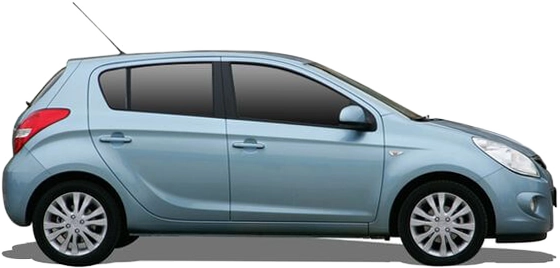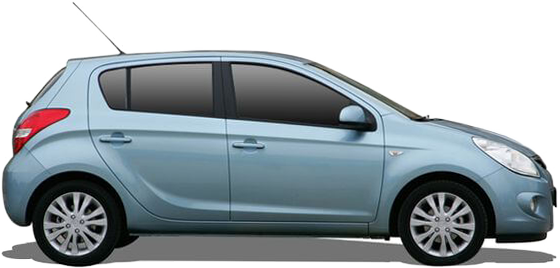The Comparative Analysis :
BMW i3 60 Ah (13 - 17) vs. Hyundai i20 5-door 1.4 LPG Automatic (Autogas) (10 - 10)
€ 35,000

€ 18,800

€ 35,000
Base Price ⓘBase price of a new vehicle with standard equipment in Germany at market launch.
€ 18,800
ⓘBase price of a new vehicle with standard equipment in Germany at market launch. Price Info
Vehicle Dimensions
The BMW i3 (60 Ah) is considerably bigger in every dimension. It's 5.9 cm longer, 6.5 cm wider and 8.8 cm taller than the Hyundai i20 1.4 LPG.
BMW i3 (60 Ah)
Hyundai i20 1.4 LPG
1578
1775
2039
1490
1710
1985
1775 mm
Width
1710 mm
2039 mm
Width Incl. Mirrors
1985 mm
1578 mm
Height
1490 mm
2570
3999
2525
3940
3999 mm
Length
3940 mm
2570 mm
Wheelbase
2525 mm
Vehicle Weight
BMW i3 (60 Ah)
Hyundai i20 1.4 LPG
1280 kg
Kerb Weight
1138 kg
1630 kg
Gross Vehicle
Weight
Weight
1565 kg

Weight Difference:
142 kg
11.09 %

General
BMW i3 (60 Ah)
Hyundai i20 1.4 LPG
I01
Generation
PB
Hatchback
Car Body Style
Hatchback
Electricity
Fuel Type
Autogas (LPG)

Rear-wheel drive
Drive
Front-wheel drive

1-speed automatic transmission
Transmission
4-speed automatic transmission
Engine
BMW i3 (60 Ah)
Hyundai i20 1.4 LPG
Hybrid synchronous motor
Engine Type
Straight-four engine (naturally aspirated engine)
BMW IB1
Engine Series
IB1-P23
Engine Code
0
Valves
4
0
Cylinders
4
0 CC
Engine Capacity
1396 CC
168 bhp
at 4800 rpm
Power
94 bhp
at 5500 rpm
BMW i3 (60 Ah)
168 bhp
94 bhp
Hyundai i20 1.4 LPG
250 NM
at 1 rpm
Max. Torque
137 NM
at 4200 rpm
BMW i3 (60 Ah)
250 NM
137 NM
Hyundai i20 1.4 LPG
Performance
BMW i3 (60 Ah)
Hyundai i20 1.4 LPG
93 mph
Maximum Speed
104 mph
7.2 sec
Acceleration 0 to 62 mph
12.9 sec
62 mph
62
mph
mph
100 m
0.000 sec

BMW i3 (60 Ah)
62 mph
62
mph
mph
179 m
0.000 sec

Hyundai i20 1.4 LPG
▶ REPLAY
7.62 kg/bhp
Weight-to-Power Ratio
12.11 kg/bhp
BMW i3 (60 Ah)
7.62 kg/bhp
12.11 kg/bhp
Hyundai i20 1.4 LPG
Fuel Economy / Emissions
BMW i3 (60 Ah)
Hyundai i20 1.4 LPG
Fuel Economy
21 kWh✽
( 193 MPGe ⓘ Miles per gallon petrol equivalent (MPGe) is a measure of the average distance traveled per unit of energy consumed. MPGe, specified in miles per imperial gallon (~4.546 litres), is used to compare the energy consumption of vehicles that use different energy sources.)
combined ✽ per 100 miles
34 mpg
( 25 MPGe ⓘ Miles per gallon petrol equivalent (MPGe) is a measure of the average distance traveled per unit of energy consumed. MPGe, specified in miles per imperial gallon (~4.546 litres), is used to compare the energy consumption of vehicles that use different energy sources.)
BMW i3 (60 Ah)
193 MPGe
25 MPGe
Hyundai i20 1.4 LPG
No data
city
27 mpg
No data
motorway
40 mpg
19 kWh
Fuel Tank Capacity
38 L
91 mi
Range
285 mi
BMW i3 (60 Ah)
91 mi
285 mi
Hyundai i20 1.4 LPG
Environmental Impact
42 kWh
Total Energy Consumption
per 100 miles ⓘThe total energy consumption per 100 miles is the amount of energy consumed by a vehicle when burning fuel or using electricity per 100 miles (final energy), and the energy required to produce the appropriate amount of fuel or electricity (primary energy).
per 100 miles ⓘThe total energy consumption per 100 miles is the amount of energy consumed by a vehicle when burning fuel or using electricity per 100 miles (final energy), and the energy required to produce the appropriate amount of fuel or electricity (primary energy).
122.3 kWh
BMW i3 (60 Ah)
42 kWh
122.3 kWh
Hyundai i20 1.4 LPG
Elektrofahrzeug
Emission Standard
Euro 4
0 g/km (NEFZ)
CO2 Emissions
134 g/km (NEFZ)
Practical Convenience
BMW i3 (60 Ah)
Hyundai i20 1.4 LPG
5
Doors
5
4
No. of Seats
5
350 kg
Maximum Payload
427 kg
260 L
Boot Capacity
295 L





1100 L
Boot Capacity (Seats Down)
1060 L























